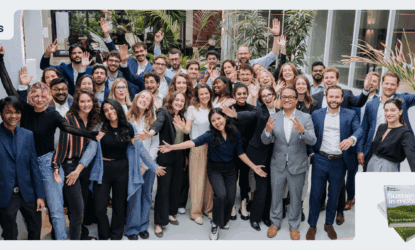 Your top ten sustainability reporting questions answered
Your top ten sustainability reporting questions answered
“EcoVadis goes beyond a simple rating. It serves as a structured pathway that enables organisations to continually advance sustainability management through well-defined policies, meaningful actions, and transparent results.”
Achieving robust sustainability management is increasingly a requirement for organisations navigating complex reporting standards, stakeholder expectations, and supply chain challenges. This article distils practical insights from the recent Nexio Projects webinar: “Using EcoVadis to strengthen your sustainability management system.” Key chapters include building strong foundations, understanding EcoVadis methodology, applying the Policy-Action-Results (PAR) framework, and strategies for continual improvement.
What is EcoVadis and why does it matter?
Understanding EcoVadis assessment
EcoVadis is a comprehensive sustainability ratings platform trusted globally by thousands of companies to assess and validate their sustainability practices. The EcoVadis Rating goes far beyond a simple certification. It uses objective criteria to score organisations on four pillars: environment, labour and human rights, ethics, and sustainable procurement. Each pillar is tailored for industry, size, and location, ensuring relevant and meaningful benchmarking for every business context.
EcoVadis certification benefits
Receiving an EcoVadis score unlocks a clear pathway for supply chain management, reporting alignment, and ongoing sustainability improvement. EcoVadis Gold or Platinum status distinguishes companies as sector leaders, fostering trust with customers, partners, and regulators.
Watch our video series by EcoVadis consultants, and unlock EcoVadis; from basics to tailored strategies.

Building a sustainability management system
The sustainability management system framework
A sustainability management system (SMS) is a structured collection of policies, processes, and controls supporting organisations to meet sustainability goals. The most widely recognised standard, ISO 26000 (“social responsibility”), provides a foundation for building an SMS relevant to any sector.
Setting the right foundations
Getting started means mapping out material sustainability topics based on business context, peer benchmarking, and EcoVadis’s activated criteria. Internal ambition, clear commitments and qualitative objectives, should be established in concise policy documents, covering all material topics with explicit scope, review mechanisms, and responsibility allocation.
Applying the EcoVadis PAR Framework
Policies, Actions, Results: The PAR Methodology
EcoVadis evaluates management systems using its Policy-Action-Results (PAR) structure:
- Policies (25%): Foundations of sustainability direction, including qualitative commitments and measurable, SMART targets, public endorsements.
- Actions (40%): Represented by tangible steps, training, certifications, and measures implemented across company entities.
- Results (35%): Focus on KPI tracking, internal and external reporting and stakeholder feedback (including the 360 Watch score).
This process is iterative, with each category informing and strengthening the others.
Tailoring to company context
EcoVadis’s approach customises its methodology for each company’s industry and maturity. For example, manufacturing firms are often required to address topics such as water, biodiversity, pollution, and product end-of-life, whereas consulting services may focus more on environmental advocacy and diversity initiatives.
Scoring breakdown and weighting
How EcoVadis calculates scores
The EcoVadis Score is broken down as follows:
- Policies: 20% for foundational documents; 5% for verifiable endorsements.
- Actions/Measures: 24%, with more points awarded for having multiple, documented measures per activated criterion.
- Certifications: 16%, for accredited achievements like ISO 14001.
- Coverage Multiplier: Assesses how broadly implemented actions and certifications are across the business.
- Reporting: 14% weight for internal KPIs & external reporting; 21% for 360 Watch—scraping external news that affects reputation.
The weights vary by industry and are dynamically optimised, meaning higher-impact areas get more focus.
Achieving higher scores
To progress from Bronze or Silver toward EcoVadis Gold or Platinum, a company must not only broaden coverage but deepen quantitative targets, with externally verified reporting and comprehensive policy updates.
Download our latest EcoVadis guide, where our sustainability expert breaks down the latest methodology updates, strategic actions and best practices.
Where should your company start?
The maturity curve
Beginner level: Foundations first
Companies starting out should:
- Define material topics by reviewing their business model, peers, and EcoVadis criteria.
- Focus on qualitative policies and consolidate similar subjects.
- Implement easy, resource-light actions (e.g. employee training, grievance procedures)
- Start internal KPI tracking linked to essential policies.

A wholesaler of household goods, new to EcoVadis, introduced foundational policies, and built an Excel-based KPI dashboard — achieving Bronze medal and a strong management system foundation.
Intermediate level: Adding structure and credibility
At this stage, organisations should:
- Perform more comprehensive materiality assessments (impact or financial, aligned to GRI, IFRS, or SASB).
- Track three years of KPI data.
- Launch sustainability reporting and secure ISO or similar certifications.
- Set quantitative targets (including Science Based Targets for emissions).
- Extend coverage of measures to every site or entity.

A chemicals company moved from EcoVadis Silver to Gold by formalising SBTi target setting, launching ESG trainings, publishing an inaugural sustainability report, and endorsing the UN Global Compact.
Advanced level: Best practice and verification
Advanced organisations integrate best practice across their operations:
- Conduct double materiality assessments and regularly review policies.
- Expand actions and certifications business-wide.
- Secure external audits for controls and ESG practices.
- Integrate ESG KPIs with ERP and financial reporting, externally verified.

A logistics company maintained its Platinum medal by implementing a supply chain sustainability strategy that included double materiality analysis, increased procurement action coverage, and external KPIs verification.
Using the EcoVadis scorecard for continuous improvement
Prioritisation
Improvement efforts should focus on indicators and themes that scored below 100/100, especially those that contribute most to the overall weighted score. Feasibility and resource assessment are crucial—starting with achievable improvements before tackling extensive certifications.
Corrective action plan
EcoVadis’s corrective action plan provides prioritised recommendations. Filtering by highest weight and cross-referencing with the scorecard helps ensure improvements are targeted for maximum impact.
Q&A: Common questions addressed live
Can a small business complete the EcoVadis Assessment?
Yes. EcoVadis’s classification starts from “extra small” (XS), and companies with even 7 employees have successfully participated.
Is it possible to merge documents on EcoVadis?
EcoVadis no longer accepts merged documents, except for certifications for different company sites and training material combined with training attendance lists. This makes it harder to stay within the 55 new documents limit every year.
How can a company challenge an incorrect classification by EcoVadis?
Reach out directly through EcoVadis’s support site. Several cases have been resolved positively by correcting the group/entity status.
How do negative or positive news items influence the EcoVadis Score?
EcoVadis’s 360 Watch scrapes internet sources for relevant news. Negative news can reduce scores and medal eligibility for several years, while verified positive news can boost your result when aligned to sustainability pillars.
Is external reporting mandatory for higher EcoVadis Scores?
Yes. Companies cannot score above 50% in the reporting section without an externally published sustainability report that meets standards such as GRI or ESRS or has been externally audited.
How Nexio Projects can support your EcoVadis journey
A leading sustainability consultancy, Nexio Projects has been named one of the top 10 boutique ESG and sustainability strategy consultancies worldwide by Verdantix. Our team brings clarity to all aspects of your sustainability journey, from compliance, reporting, CSRD implementation, to strategic supply chain engagement.
Providing ESG advisory through:
- EcoVadis strategic partner since 2018
- Proud holder of EcoVadis Platinum certification
- Full support across EcoVadis Assessment, gap analysis, scorecard interpretation, reporting, and improvement planning
- Experience spanning 400+ clients in 25+ sectors
From initial assessment review to advanced strategy, Nexio Projects provides expert guidance to maximise your performance and streamline your sustainability management system. Book a free consultation now to discuss your EcoVadis journey.
Sign up to our newsletter for monthly EcoVadis updates and expert tips on sustainability management.












